Autobiography Questions & Prompts for Students

Writing about one’s own life can be inspiring and terrifying at the same time. No matter why you must prepare an autobiography, it allows you to get to know yourself better and become more open.
A student autobiography is one of the most commonly met types of autobiographical writing. You might need to write one when applying to a college or university. In an essay about yourself, you must catch your readers’ attention, leaving an impression of an outstanding learner and person. You’re in the right place if you are stuck preparing a student autobiography. This article will guide you through the writing process, offering autobiography questions for students together with valuable prompts.
- 70 Autobiography Questions
- 5 Exciting Prompts

70 Autobiography Questions for Students
The first thing you should remember when writing an autobiography is that all types of clichés can kill your paper. The standard scheme “was born – went to school – went to college” won’t impress anyone. However, the following autobiography quiz, which contains the most common questions, can be an effective start for brainstorming the subject.
- When and where were you born?
- Who are your family members?
- What are the most impressive of your childhood memories?
- Were there any family traditions that influenced you?
- Who were your best childhood friends?
- What was the most exciting experience of your early childhood?
- Were there any challenging experiences?
- How did your first day of school go?
- What school subject did you like most, and why?
- Can you recall a memorable teacher who influenced you?
- What was your favorite book as a child?
- Did you have a hobby as a child?
- Are there any childhood interests or hobbies that still excite you?
- Did art or music play a role in your life?
- What were your dearest childhood dreams?
- How did your dreams change when you’ve grown older?
- Do you remember a moment in your childhood when you were very proud of yourself?
- What were your most memorable trips?
- What was your most adventurous experience?
- What’s the most exotic dish you’ve tried?
- How has travel shaped your personality?
- Were there any difficult moments in life you had to overcome?
- How did you find the strength and courage to overcome them?
- What was the most spectacular failure in your life?
- What valuable lessons did you learn from your failures?
- How did your values change over the years?
- Which of your experiences influenced your personal growth most?
- Do you have any famous people you admire?
- Is there anyone among your loved ones who is a role model for you?
- Do you remember falling in love for the first time?
- Have you experienced any heartbreaks?
- How do you define love?
- Are love and relationships important in your life?
- Have you faced any relationship challenges?
- What have you learned from the relationship hardships you had?
- Have you already chosen a career path?
- Would you like to develop in one career direction all your life or change professions?
- What are your professional aspirations and goals?
- Do you have any work experience and achievements?
- How would you describe yourself?
- Do you feel that your identity has changed throughout your life?
- Is your cultural identity important to you?
- What does it mean to be true to yourself?
- Are there any milestones in your life, like awards or personal achievements?
- How did you celebrate these achievements?
- Are there any achievements that changed your aspirations and perspective?
- Do you have any experience of volunteering?
- Has your experience of giving back to your community changed your life?
- How do you imagine your life in 10, 20, 30 years?
- Is there any contribution you would like to make?
- How would you like your loved ones to remember you?
- Do you have a life motto?
- Do you have a favorite movie character?
- Who is your least favorite movie character, and why?
- How do you define success?
- What is happiness for you?
- Do you have any healthy habits or practices?
- Have you ever faced any health challenges?
- Have these challenges influenced your personality?
- Is the environment important to you?
- How do you address environmental issues that bother you?
- Do you have any experiences related to environmental activism?
- What makes you happy?
- What was the happiest moment of your life?
- Is there something you regret about?
- What did you learn from the moments you regret about?
- Were there any turning points that led your life in a new direction?
- How did you feel during these moments?
- Is it essential for you to live a meaningful life?
- How would you define the meaning of life?
5 Exciting Student Autobiography Prompts
The questions discussed above focus on the most common ingredients, which can become good building blocks for your autobiography. However, you should add some spice to your life story to prevent your readers from falling asleep.
To do this, here are 5 exclusive prompts to find topics for an autobiography that will breathe life into your memoir, making it uniquely interesting. If you’re still in a lack of ideas after reading them, check the collection of free essays on any topic imaginable.
Here are the prompts:
- Has the world changed during your life, and how do you feel about these changes? Reflect on the transformations you’ve witnessed, such as the technological advancements , the emergence of the Internet, and social networking platforms. How have these changes impacted your life, your habits, and your worldview? Share your thoughts on the topic.
- What is your contribution to the future of this planet, and how did you choose it? Consider the various ways to make a positive impact on the environment. You can focus on simple actions that everyone can perform, like reducing the use of plastic bags. Explain what motivated you to make these decisions.
- What would you tell your dear ones if you knew that you had only one day more to live on earth? What heartfelt messages would you share with your family, friends, neighbors, and all the people in the world? Use this scenario to dig deep into your values and beliefs.
- What occupation would you choose if you did not have to earn your living? Explore your passions, interests, and dreams. Imagine the ideal career path or artistic pursuit that truly resonates with your inner self.
- If you could exclaim, “ Stay moment, you are so fair! ”, would you do it? Did this special moment pass away, or do you believe it is yet to come in your future? Explain what makes these moments special and how they have shaped your life or continue to influence your journey.
Thank you for reading this article! If you wish to polish separate sections of your assignment, you are welcome to use the writing tools we’ve developed:
- Thesis statement maker
- Summary tool
- Paragraph & word changer
- Autobiography Definition, Examples, and Writing Guide
- 5 Ways to Write an Autobiography
- How to Write a Memoir
- The naked truth: how to write a memoir | Books
Related Posts
Eragon movie essay writing: some themes for students to develop.

Computer Science Dissertations: Great Topics for Discussion
Certificate in education essays: some tips for students, theology dissertation: time to choose a good dissertation topic, ideas for dissertations on film.
Autobiography Questions: What to Include & 60 Prompts for Students
When you are assigned an autobiography to write, tens or even hundreds of questions start buzzing in your head. How do you write autobiography essay parts? What to include? How do you make your autobiography writing flow? Don’t worry about all this! Use the following three simple principles and 60 autobiography questions for students to write a life story about yourself that truly deserves a high grade.
And don’t forget to bookmark Custom-writing.org , here you’ll find tons of study advice and superior writing help.
- ❗ 3 Main Principles
- 🤗 What to Include?
- ❓ 50 Questions
- 🤓 10 Autobiography Q&A
🔗 References
❗ how to write autobiography: 3 main principles.
First and foremost, you should remember that an autobiography (also called a memoir) is a story about your own life. If you write the life story of another person, that is called a biography.
You will quickly write a winning autobiography if you follow these three simple principles:
- Make it logical . Choose one main idea and express it in a thesis statement to combine all memories into a meaningful whole.
- Do not be a bore . Reveal some personal details and tell something that nobody but you can tell.
- Make it easy to read . Include an introduction, main body, and conclusion ; do not hesitate to use a new paragraph to develop a new idea; avoid using overly complicated language and constructions.
🤗 What to Include in an Autobiography?
- Explore your background . Try to recall how a biography of a prominent person usually starts. It always opens with their parents’ or even grandparents’ achievements or vices. Rather than beginning the autobiography with your date of birth, dedicate a paragraph to your ancestors. Providing background information will put your life into a complete picture. The following questions will help you decide which events prior to your birth are worth attention.
- Pick out your childhood memories . This is the most touching paragraph of your piece of writing. Even though your childhood may seem ordinary, the following template questions will guide you in the right direction. Something in your life will always be unique for everybody else.
- Research your culture . Your family traditions are unique. In the modern world, every family is free to observe or ignore some customs. Special moments are what we recall many years later. Sometimes they are formed spontaneously, but most of them are created by our family, friends, and relatives.
❓ 50 Questions for Writing an Autobiography
Even when you use the 3 above-discussed principles, you might still stumble in the middle of your autobiography. Your inspiration can betray you after you start writing a memoir. But the following 50 questions won’t let you down. This list will help you generate brilliant ideas for your autobiographies whenever you need them:
- What famous quote can describe your life?
- Which 3 adjectives can be used to describe you as a person?
- Who influenced your personal development?
- What are your best and worst childhood memories?
- What is your family social and ethnic background?
- What is your relationship with parents and other relatives?
- What is your culture?
- What are your main achievements in life?
- What are the weaknesses that you would like to get rid of?
- What are your goals for the future?
- What places would you like to visit and why?
- What does it mean to be American?
- What skills would you like to develop and why?
- What was the most memorable day in your life?
- What was the most important lesson you have ever learned?
- How did your life values transform after the global lockdown?
- What are the most important values in life, in your opinion?
- Which fault would you never forgive in others or yourself?
- Does ethnic identity play an important role in your life?
- How will the W. P. Carey MBA help you achieve your goals?
- What leadership skills do you have?
- What is your personal health vision?
- What is your opinion of art?
- What are the main qualities of a true friend?
- What is the role of music in your life?
- What do you think of classical music?
- Can you describe your first day at college?
- What is marriage, in your opinion?
- What lessons did you derive from your first semester at school?
- What do you think of epistemology philosophy?
- Have you ever attended logic courses?
- Is success or talent really the outcome of hard work?
- What are your impressions from your last vacation?
- What impact does your emotional intelligence has on your personal relationships?
- What do you think of aging?
- Does your personal happiness depend on household activities?
- Does making mistakes help you?
- Have you ever adopted a pet?
- What did you learn from your first job?
- How was your first date?
- What is your ideal social meeting place?
- What challenges did your friendship face?
- Why would you be a good nurse?
- What does being responsible mean to you?
- What steps do you take to improve your interpersonal relations?
- What is your personal vision of a home?
- What did a failure at the exam teach you about hard work?
- What is your vision of d ystopia?
- What is your favorite superheroine and why?
- What career would you like to choose?
If you are a student, your life story might not be that long. However, these 15 questions will guide you in writing an autobiography that you can be proud of and the 3 simple principles discussed above will help you make your memoir flawless.
🤓 10 Autobiography Questions and Answers
Below, we’ve listed some autobiography questions with possible short answers. You can use them as a starting point for writing your autobiography.
Q1: What did you learn from your first breakup?
My first heartbreak was a brutal teacher, but it shaped my identity. This hurtful episode initially shook my self-esteem, but ultimately, it turned me into a new version of myself. I learned self-love and resilience and understood what I genuinely needed in a partner.
Q2: How do you measure your personal growth?
I think personal development is about becoming an enhanced version of yourself. I compare myself with who I was yesterday. This way, I measure my advancement to notice any improvements and identify areas where I still should work.
Q3: What role does spirituality play in your life?
Spirituality is my moral compass. It helps me do what is right and empowers me to withstand hardships. It also makes my life purposeful and lets me feel part of something greater than myself.
Q4: What is your biggest professional failure?
When I worked as an SMM manager, I missed a project deadline. It was a challenging experience, but I learned from it. I recognized the significance of knowing my limits and asking for help.
Q5: How important is physical appearance to you?
I care about my looks, but it isn’t everything. Undoubtedly, looking good helps me feel confident, but I realize what truly matters is on the inside. It is our kindness, intelligence, and honest hearts that make us who we are.
Q6: What is your stance on animal rights?
As a vegan, I deeply care about animal rights. I believe exploiting animals on factory farms, in zoos, at the circus, or in horse racing is barbaric and outdated.
Q7: How do you balance work and personal life?
Work-life balance is troublesome, but I handle it by trying to be fully present in the moment. Whether working or hanging out with loved ones, I concentrate on what I’m doing. To keep the balance, I regularly adjust my calendar to ensure I have time for relaxation and hobbies.
Q8: What is your love language?
My love language is receiving and presenting gifts. I feel so loved and valued when someone takes the time to choose a thoughtful gift reflecting their understanding of my tastes and passions.
Q9: Have you ever thought of becoming vegetarian?
I’ve never pondered going veggie. While I admire individuals who are vegetarian for moral or health grounds, I cannot give up consuming meat products.
Q10: What is your attitude towards globalization?
I’m not enthusiastic about globalization. It can worsen economic inequalities and diminish cultural diversity. Globalization frequently puts corporations’ interests before local communities’ needs, resulting in unfair treatment at work and the misuse of resources.
- Autobiography | Definition, History, Types, Examples, & Facts. Britannica
- What Is an Autobiography? (And How to Write Yours) – ThoughtCo
- The Autobiography of a Student – jstor
- THE STUDENT AUTOBIOGRAPHY: structured or unstructured? Wiley Online Library
- 5 Ways to Write an Autobiography – wikiHow
- Share to Facebook
- Share to LinkedIn
- Share to email

A life experience essay combines the elements of narration, description, and self-reflection. Such a paper has to focus on a single event that had a significant impact on a person’s worldview and values. Writing an essay about life experience prompts students to do the following: You may struggle with such...

Who has made a significant impact in your life and why? Essay on the topic might be challenging to write. One is usually asked to write such a text as a college admission essay. A topic for this paper can be of your choice or pre-established by the institution. Either...

Are you about to start writing a financial assistance essay? Most probably, you are applying for a scholarship that will provide additional funding for your education or that will help you meet some special research objectives.
![autobiography example questions Growing Up Essay: Guide & Examples [2024]](https://custom-writing.org/blog/wp-content/uploads/2020/12/gardening-concept-with-mother-daughter-284x153.jpg)
What does it mean to grow up? Essays on this topic might be entertaining yet challenging to write. Growing up is usually associated with something new and exciting. It’s a period of everything new and unknown. Now, you’ve been assigned to write a growing up essay. You’re not a kid...
![autobiography example questions Murder Essay: Examples, Topics, and Killer Tips [2024]](https://custom-writing.org/blog/wp-content/uploads/2020/12/man-holding-gun-as-evidence-284x153.jpeg)
Probably, a murder essay is not a fascinating assignment to complete. Talking about people’s deaths or crazy murderers can be depressing. However, all assignments are different, and you are supposed to work on every task hard. So, how are you going to deal with a murder essay? You can make...

Are you a nursing student? Then, you will definitely have an assignment to compose a nursing reflective essay. This task might be quite tough and challenging. But don’t stress out! Our professionals are willing to assist you.
![autobiography example questions Remembering an Event Essay: Examples and Guidelines [Free]](https://custom-writing.org/blog/wp-content/uploads/2020/12/businessman-touching-eyeglasses-is-using-digital-tablet-284x153.jpg)
Throughout our life, we meet plenty of people and participate in various events. If some of them are just regular, the other people or occasions play a critical role in our fates. Your life-changing experience might become a perfect ground for creating a remembering essay.
![autobiography example questions Environment vs. Development Essay: Tips & Topics [2024]](https://custom-writing.org/blog/wp-content/uploads/2020/12/storage-tanks-284x153.jpg)
Environment vs. development is a multifaceted present days’ dilemma. On the one hand, environmental problems are increasing year after year. We have more polluted areas on our planet, more polluted rivers, fewer trees that produce oxygen. On the other hand, can we stop development and progress in various fields? Is...

What does an essay look like? At a glance, the answer is obvious. An essay looks like a mere piece of paper (one page or several pages) with an organized text. It’s generally divided into five paragraphs, though there may be more. The essential essay structure includes: Yet, will this...

Some students find writing literary analysis papers rather daunting. Yet, an English class cannot go without this kind of work. By the way, writing literary analysis essays is not that complicated as it seems at a glance. On the contrary, this work may be fascinating, and you have a chance...

These days, leadership and ability to work in a team are the skills that everybody should possess. It is impossible to cope with a large educational or work project alone. However, it can also be challenging to collaborate in a team. You might want to elaborate on importance and difficulties...

Racial profiling is not uncommon. It’s incredibly offensive and unfair behavior that causes most of the protests in support of people of color. It occurs when people are suspected of committing a crime based on their skin color or ethnicity. Unfortunately, most people are unaware that racial profiling is an everyday...
I appreciate the time and effort you put into this for that!
You really helped me with this paper and fun fact I am still in primary school 🙃😏
Thank you so much for this guide questions, this really helps a lot especially to those who really don’t have any idea on how to write an autobiography may God bless you and expand your storehouse..
Very interesting. Can your team actually put a rough autobio together for someone using their ideas and answering all the questions….its a bit more involved than I would like it to be. If I could get a rough story on print… is that something your company does & a ballpark cost if you do…thank you
How many words should there be in an autobiography?
I am 77 Plan to write my autobygraphi.very useful tips and guidence .Thanks so much.

Your essay should not be too long, it’s about 5 paragraphs, but it’s better to double check the requirements with your professor.
Thank you so much for sharing. I highly appreciated. Maraming Salamat Po.
Am very much great full to the tips provided. It has opened my mind wide on how to start and what to include in writing autobiography. Thank you.
I have been wanting to write my autobiography for sometime but didn’t have a clear idea how to start and what to include. I am seventy six years old and time is running out. You have inspired me to forge ahead with this project by encouraging and sharing your ideas. This is the impetus I needed to start my life story. Thank you from the bottom of my heart.

Best autobiography questions

Home » Questions » Best autobiography questions
Writing an autobiography can be a powerful way to reflect on your life experiences, share your story, and leave a lasting legacy. Whether you’re writing for personal reasons or planning to publish your autobiography, asking yourself the right questions can help you delve deep into your memories and uncover meaningful insights. In this article, we will explore a comprehensive list of autobiography questions that can guide you in the process of writing your life story.
Before we dive into the list of questions, it’s important to remember that autobiographies are unique to each individual. These questions are meant to inspire and assist you in your writing journey, but feel free to adapt and modify them to suit your specific needs. Remember, the goal is to tell your story authentically and in a way that resonates with your readers.
Now, let’s explore the list of autobiography questions that can help you get started on your writing endeavor:
See these autobiography questions
- What is your earliest childhood memory?
- Who were the most influential people in your life growing up?
- What were your favorite hobbies as a child?
- How would you describe your relationship with your parents?
- What challenges did you face during your teenage years?
- What memorable moments do you have from your school days?
- What was your first job, and how did it shape your career path?
- Describe a significant turning point in your life.
- What were the highlights of your college/university experience?
- How did you meet your significant other?
- What was the happiest moment of your life?
- What was the most challenging period of your life, and how did you overcome it?
- What values and beliefs do you hold dear?
- What are your greatest achievements?
- What are your biggest regrets?
- Describe a life-changing trip or vacation you’ve taken.
- What lessons have you learned from your mistakes?
- What role has spirituality played in your life?
- How have your career choices impacted your personal life?
- What are your hopes and dreams for the future?
- Describe a difficult decision you had to make.
- What are your favorite books and why?
- What are your fondest memories of your hometown?
- How have your friendships evolved over the years?
- Describe a time when you felt truly proud of yourself.
- What have you done to overcome adversity?
- What were the most significant historical events that shaped your life?
- How has technology influenced your life?
- What are your favorite quotes and why?
- Describe a mentor or role model who has had a profound impact on your life.
- What are your favorite childhood traditions?
- How have your priorities shifted as you’ve grown older?
- What are your favorite movies and why?
- Describe a time when you had to step out of your comfort zone.
- What advice would you give to your younger self?
- How have you dealt with loss and grief?
- What are your favorite songs and why?
- Describe a time when you had to make a sacrifice for someone you love.
- What are your favorite life lessons?
- How have your beliefs and values evolved over time?
- What are your favorite childhood memories?
- Describe a time when you felt truly inspired.
- What legacy would you like to leave behind?
These autobiography questions are just a starting point to help you explore different aspects of your life. As you write and reflect on your experiences, remember to be honest, vulnerable, and true to yourself. Your autobiography has the power to not only inspire and entertain others but also to provide you with a deeper understanding of your own journey.
Related Post:
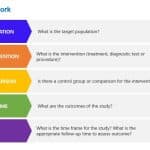
Leave a Comment Cancel reply
Save my name, email, and website in this browser for the next time I comment.

Best ally financial interview questions

Best adler quotes

Best kitchen riddles for treasure hunt

Best japanese name for spring

Best nickname for francis

Best genre of poems

© the narratologist 2024

63 Best Memoir Writing Prompts To Stoke Your Ideas
You’re writing a memoir. But you’re not sure what questions or life lessons you want to focus on.
Even if only family members and friends will read the finished book, you want to make it worth their time.
This isn’t just a whimsical collection of anecdotes from your life.
You want to convey something to your readers that will stay with them.
And maybe you want your memoir’s impact to serve as your legacy — a testament to how you made a small (or large) difference.
The collection of memoir questions in this post can help you create a legacy worth sharing.
So, if you don’t already have enough ideas for a memoir, read on.
A Strong Theme
Overcoming obstacles, emotional storytelling, satisfying ending, examples of good starting sentences for a memoir , 63 memoir writing prompts , what are the primary parts of a memoir.
Though similar to autobiographies, memoirs are less chronological and more impressionable – less historical and more relatable.
Resultantly, they’re structured differently.
With that in mind, let’s look at five elements that tie a memoir together, rendering it more enjoyable.
Biographies are histories that may not hew to a cohesive theme. But memoirs focus on inspiring and enlightening experiences and events.
As such, books in the genre promote a theme or idea that binds the highlighted happenings to an overarching reflection point or lesson.
Many people are super at sniffing out insincerity, and most folks prefer candidness.
So while exact dates and logistical facts may be off in a memoir, being raw and real with emotions, revelations, and relational impacts is vital. To put it colloquially: The best personal accounts let it all hang out.
People prefer inspiring stories. They want to read about people overcoming obstacles, standing as testaments to the tenacious nature of the human spirit. Why?
Because it engenders hope. If this person was able to achieve “x,” there’s a possibility I could, too. Furthermore, people find it comforting that they’re not the only ones who’ve faced seemingly insurmountable impediments.
Readers crave emotion. And for many of the stoic masses, books, plays, television shows, and films are their primary sources of sentimentality.
Historically, the best-performing memoirs are built on emotional frameworks that resonate with readers. The goal is to touch hearts, not just heads.
In a not-so-small way, memoirs are like romance books: Readers want a “happy” ending. So close strongly. Ensure the finale touches on the book’s central themes and emotional highlights.
End it with a smile and note of encouragement, leaving the audience satisfied and optimistic.
Use the following questions as memoir writing exercises . Choose those that immediately evoke memories that have stayed with you over the years.

Group them by theme — family, career, beliefs, etc. — and address at least one question a day.
For each question, write freely for around 300 to 400 words. You can always edit it later to tighten it up or add more content.
1. What is your earliest memory?
2. What have your parents told you about your birth that was unusual?
3. How well did you get along with your siblings, if you have any?
4. Which parent were you closest to growing up and why?
5. What parent or parental figure had the biggest influence on you growing up?
6. What is your happiest childhood memory?
7. What is your saddest or most painful childhood memory?
8. Did you have good parents? How did they show their love for you?
9. What words of theirs from your childhood do you remember most, and why?
10. What do you remember most about your parents’ relationship?
11. Were your parents together, or did they live apart? Did they get along?
12. How has your relationship with your parents affected your own love relationships?
13. Who or what did you want to be when you grew up?
14. What shows or movies influenced you most during your childhood?
15. What were your favorite books to read, and how did they influence you?
16. If you grew up in a religious household, how did you see “God”?
17. How did you think “God” saw you? Who influenced those beliefs?
18. Describe your spiritual journey from adolescence to the present?
19. Who was your first best friend? How did you become friends?
20. Who was your favorite teacher in elementary school, and why?
21. Did you fit in with any social group or clique in school? Describe your social life?
22. What were your biggest learning challenges in school (academic or social)?
23. Who was your first crush, and what drew you to them? How long did it last?
24. What was your favorite subject in school, and what did you love about it?
25. What do you wish you would have learned more about growing up?
26. What did you learn about yourself in high school? What was your biggest mistake?
27. What seemed normal to you growing up that now strikes you as messed up?
28. How old were you when you first moved away from home?
29. Who gave you your first kiss? And what do you remember most about it?
30. Who was your first love ? What do you remember most about them?
31. Was there ever a time in your life when you realized you weren’t straight?
32. Describe a memorable argument you had with one of your parents? How did it end?
33. Have you lost a parent? How did it happen, and how did their death affect you?
34. What was your first real job? What do you remember most about it?
35. How did you spend the money you earned with that job?
36. At what moment in your life did you feel most loved?
37. At what moment in your life did you feel most alone?
38. What do you remember most about your high school graduation? Did it matter?
39. What’s something you’ve done that you never thought you would do?
40. What has been the greatest challenge of your life up to this point?
41. What did you learn in college that has had a powerful influence on you?
42. How has your family’s financial situation growing up influenced you?
43. How has someone’s harsh criticism of you led you to an important realization?
44. Do you consider yourself a “good person”? Why or why not?
45. Who was the first person who considered you worth standing up for?
46. If you have children, whom did you trust with them when they were babies?
47. Did you have pets growing up? Did you feel close or attached to any of them?
More Related Articles
66 Horror Writing Prompts That Are Freaky As Hell
15 Common Grammar Mistakes That Kill Your Writing Credibility
61 Fantasy Writing Prompts To Stoke Your Creativity
48. Describe someone from your past whom you’d love to see again.
49. Do you have a lost love? If yes, describe them, how you met, and how you lost them.
50. Describe a moment when you made a fool of yourself and what it cost you.
51. What is something you learned later in life that you wish you’d learned as a child?
52. How do you want others to see you? What words come to mind?
53. What do you still believe now that you believed even as a child or as a teenager?
54. What do you no longer believe that you did believe as a child or teenager?
55. When have you alienated people by being vocal about your beliefs?
56. Are you as vocal about your beliefs as you were when you were a young adult ?
57. Are you haunted by the consequences of beliefs you’ve since abandoned?
58. How have your political beliefs changed since you were a teenager?
59. Have you ever joined a protest for a cause you believe in? Would you still?
60. How has technology shaped your life for the past 10 years?
61.Has your chosen career made you happy — or cost you and your family too much?
62. What comes to mind if someone asks you what you’re good at? Why does it matter?
63. How is your family unique? What makes you proudest when you think about them?
We’ve looked at the elements that make memoirs shine. Now, let’s turn our attention to one of the most important parts of a personal account: the opening sentence.
We’ve scoured some of the most successful, moving memoirs of all time to curate a list of memorable starting sentences. Notice how all of them hint at the theme of the book.
Let’s jump in.
1. “They called him Moishe the Beadle, as if his entire life he had never had a surname.” From Night, a first-hand account of the WWII Holocaust by Elie Wiesel
2. “My mother is scraping a piece of burned toast out of the kitchen window, a crease of annoyance across her forehead.” From Toast: The Story of a Boy’s Hunger, foodie Nigel Slater’s account of culinary events that shaped his life.
3. “Then there was the bad weather.” From A Moveable Feast , Ernest Hemingway’s telling of his years as an young expat in Paris
4. “You know those plants always trying to find the light?” From Over the Top: A Raw Journey of Self-Love by Queer Eye for the Straight Guy’s beloved star, Jonathan Van Ness
5. “What are you looking at me for? I didn’t come to stay.” From Maya Angelou’s masterpiece, I Know Why the Caged Bird Sings , the story of persevering in the face of seemingly insurmountable obstacles
6. “I’m on Kauai, in Hawaii, today, August 5, 2005. It’s unbelievably clear and sunny, not a cloud in the sky.” From What I Talk About When I Talk About Running by Haruki Murakami, a memoir about the fluidity of running and writing
7. “The soil in Leitrim is poor, in places no more than an inch deep. ” From All Will be Well , Irish writer John McGahern’s recounting of his troubled childhood
8. “The past is beautiful because one never realizes an emotion at the time.” From Educated , Tara Westover’s engrossing account of her path from growing up in an uneducated survivalist family to earning a doctorate in intellectual history from Cambridge University
9. “I flipped through the CT scan images, the diagnosis obvious.” From When Breath Becomes Air by Paul Kalanithi, the now-deceased doctor’s journey toward mortality after discovering he had terminal cancer
10. “Romantic love is the most important and exciting thing in the entire world.” From Everything I Know About Love by Dolly Alderton, a funny, light-hearted memoir about one woman’s amorous journey from teenager to twentysomething
Final Thoughts
These memoir topics should get ideas flooding into your mind. All you have to do, then, is let them out onto the page. The more you write, the easier it will be to choose the primary focus for your memoir. And the more fun you’ll have writing it.
That’s not to say it’ll be easy to create a powerful memoir. It won’t be. But the more clarity you have about its overall mission, the more easily the words will flow.
Enjoy these memoir writing exercises. And apply the same clarity of focus during the editing process. Your readers will thank you.

Leave a Comment Cancel reply
This site uses Akismet to reduce spam. Learn how your comment data is processed .
Autobiography Writing Prompts To Tell Your Story

Necmettin Karakaya
Co-Founder of AI Life Story
Writing an autobiography is an incredible way to share your life story, connect with family, and preserve your experiences for future generations. However, it can be challenging to know where to start and how to structure your narrative. In this article, we'll provide you with a list of engaging writing prompts to help you begin your autobiography journey. We'll also include a FAQ section to address common questions about autobiography writing.
Autobiography Writing Prompts
Childhood memories.
- Describe your favorite childhood toy and why it was special to you.
- Share a story about your best friend growing up.
- Write about your favorite childhood vacation or family trip.
- Recall a time when you got into trouble as a child.
- Describe the neighborhood where you grew up.
- Share your favorite childhood game or activity.
- Write about a childhood hero or role model.
- Recall your favorite childhood book or movie and its impact on you.
- Describe your first day of school.
- Share a memorable childhood birthday celebration.
Family Life
- Describe a family member who has influenced your life and why.
- Share a cherished family tradition or custom.
- Write about a memorable family gathering or reunion.
- Share a story about your family's cultural background or heritage.
- Describe your relationship with your siblings.
- Write about a family member you wish you could have known better.
- Share a story about your family's history or ancestry.
- Describe your family's favorite shared activity or hobby.
- Share a time when your family supported you through a difficult period.
- Write about a lesson you learned from a family member.
Personal Challenges and Growth
- Describe a significant obstacle you've overcome in your life.
- Write about a time when you had to make a difficult decision.
- Share a moment when you faced a fear or phobia.
- Describe a time when you had to step outside of your comfort zone.
- Write about a challenging relationship or friendship in your life.
- Share a moment when you had to stand up for yourself or someone else.
- Describe a personal setback and how you recovered from it.
- Write about a time when you had to adapt to a major life change.
- Share a moment when you learned the importance of forgiveness.
- Describe a situation where you had to let go of something or someone important to you.
Achievements and Milestones
- Write about your proudest personal or professional accomplishment.
- Describe a significant award or recognition you've received.
- Share a story about achieving a long-held goal or dream.
- Write about a time when you surprised yourself with your abilities.
- Describe a moment when you inspired or motivated someone else.
- Write about a milestone birthday or anniversary.
- Share a story about an accomplishment that took significant effort to achieve.
- Describe your journey toward mastering a skill or hobby.
- Write about a time when you received unexpected praise or appreciation.
- Share a moment when you realized you had made a positive impact on someone's life.
Hobbies and Passions
- Describe your favorite hobby or pastime and how you discovered it.
- Share a story about a memorable experience related to your hobby or passion.
- Write about the role your hobby or passion plays in your life.
- Describe a person who shares your hobby or passion and how you met them.
- Write about a time when your hobby or passion helped you through a difficult time.
- Share a story about teaching or introducing someone else to your hobby or passion.
- Describe a memorable achievement related to your hobby or passion.
- Write about the challenges or obstacles you've faced in pursuing your hobby or passion.
- Share a story about a place or event related to your hobby or passion.
- Describe your future goals or aspirations related to your hobby or passion.
Unleash Your Storytelling Potential with Us.
As you explore these autobiography writing prompts, you may find that you need a little extra support to bring your life story to life. AILifeStory.com is here to help you every step of the way with our innovative AI-powered platform designed specifically for crafting autobiographies.
Our user-friendly tools and resources will assist you in:
- Organizing and structuring your story with personalized guidance
- Streamlining the writing process with AI-guided interviews and prompts
- Collaborating with family members by sharing drafts and receiving feedback
- Creating a visually appealing and engaging autobiography that captures your unique journey
Don't let your life story remain untold. Preserve your legacy and share your experiences with future generations by starting your autobiography today.
Discover AILifeStory.com and begin your journey now!
The Final Word: Bringing It All Together
Using these autobiography writing prompts can help you unlock your memories and experiences, making it easier to write a compelling and engaging life story. Remember that your autobiography is an opportunity to share your unique journey, so be honest, reflective, and open about your experiences. With dedication and creativity, you can craft a meaningful narrative that will resonate with readers and preserve your legacy for future generations.
Frequently asked questions
How can i make my autobiography more engaging, what if i can't remember specific details or events, how can i ensure my autobiography is well-structured, what if i struggle with writer's block, want to learn more.
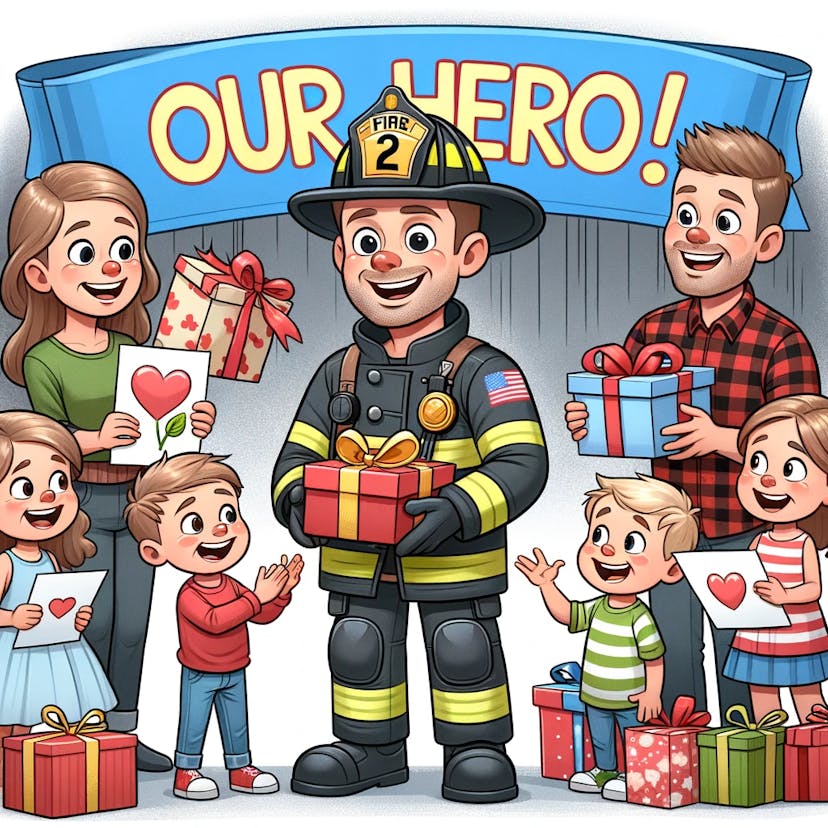
Heartfelt Farewells: Top 10 Firefighter Retirement Gifts

The Complete Guide to Hiring a Ghostwriter for Your Autobiography

Daria Smyrnova
5 Creative Mother’s Day Gift Ideas for Grandma

Oct 18, 2019 | Writing

Are you looking for an autobiography template that will help you more easily write your life story? If so, you’re in the right place so long as you’re willing to think a little outside the box of what a “traditional” one looks like. A traditional autobiography has chapters, characters, an engaging storyline and is almost always very difficult to write. A “modern-day” autobiography has all of those elements except one – they’re incredibly easy to write and you will finish your life story at the end of your efforts – guaranteed.
What’s a modern-day autobiography?
In a nutshell, it’s an interview about your life. To write it, all you need to do is answer some questions.

Taking a quick step back, have a think about your favourite TV news anchor or talk show host. No matter who you think of, whether it’s Oprah Winfrey, Diane Sawyer or someone else, the one thing they have in common is that they interview guests. Interviews are both captivating to viewers as well as being the most practical way to get interesting and meaningful information from people. That’s true for a talk show host interviewing a celebrity or a news anchor interviewing an expert for a story. A good interview is the key to their popularity and success.
Part of why we find interviews so captivating to watch or read can be explained by basic psychology. As soon as we hear a question we want to know the answer. We can’t help it – our mind wants to close the “curiosity gap” between what we already know and what we’d like to know.
Take a minute and answer these three questions:
- What’s one memory from your childhood that makes you smile?
- What’s the most valuable thing your parents taught you?
- What do you think is the key to a successful relationship?
In answering the questions above, you’ll probably notice two things: firstly, an answer immediately pops into your head, and secondly, your answer is an honest and authentic reflection of who you are and the values you hold. Part of the magic of an interview is the way you answer a question says so much about who you are. Each answer is as unique as you are.
So what does all this mean for writing your own autobiography? To write a captivating and authentic life story you need an autobiography template with a series of questions that prompts you to discuss your life experiences and values.
This is the process we use at A Life Untold to help people write and print captivating and professionally designed autobiographies in an easy and interesting way. Importantly, we leave the final book in “Q&A format” so anyone who reads your book feels like they’re listening in on an incredible conversation with you. There’s no major editing or rewriting – we want your voice to be heard.
Your autobiography template
While our full interview is over 100 questions, here are just 15 question prompts across different “life chapters” to get you started on the journey. Get the full template here.
QUICKFIRE QUESTIONS
- Name your favorite: Book, Movie, Musician, Quote, Animal, Word…
- What did you love most about school?
- Do you remember any fads from school?
- Which of these words do you associate with your work: Love, Hate, Routine, Money or something else?
- What’s something that you did at work that you’re proud of?
- What’s the bravest thing you’ve done in the name of love?
FRIENDSHIPS
- How would your close friends describe you?
- What’s one quality you think is important in a friend?
- What is one thing your children have taught you?
- What was your proudest moment as a parent?
BIG QUESTIONS
- If you could share a meal with anyone in the world, who would it be and why?
- What advice would you give to your 18 year old self?
- Don’t forget to include photos in your book. They really are worth 1,000 words!
Want more questions to answer? Turn your life story into a printed book with that your family and loved ones will treasure forever. Find out more about our process here .
Captured today, treasured for generations..

How To Write an Autobiography 2025 (Tips, Templates, & Guide)
Your life story has value, merit, and significance. You want to share it with the world, but maybe you don’t know how .
Here’s how to write an autobiography:
Write an autobiography by creating a list of the most important moments, people, and places in your life. Gather photos, videos, letters, and notes about these experiences. Then, use an outline, templates, sentence starters, and questions to help you write your autobiography .
In this article, you are going to learn the fastest method for writing your autobiography.
We are going to cover everything you need to know with examples and a free, downloadable, done-for-you template.
What Is an Autobiography?

Table of Contents
Before you can write an autobiography, you must first know the definition.
An autobiography is the story of your life, written by you. It covers the full span of your life (at least, up until now), hitting on the most significant moments, people and events.
When you write your autobiography, you write an intimate account of your life.
What Should I Include In an Autobiography?
If you are scratching your head, baffled about what to include in your autobiography, you are not alone.
After all, a big part of how to write an autobiography is knowing what to put in and what to leave out of your life story. Do you focus on every detail?
Every person? Won’t your autobiography be too long?
A good way to think about how to write an autobiography is to use the Movie Trailer Method.
What do movie trailers include?
- High emotional moments
- The big events
- The most important characters
When you plan, organize, and write your autobiography, keep the Movie Trailer Method in mind. You can even watch a bunch of free movie trailers on YouTube for examples of how to write an autobiography using the Movie Trailer Method.
When wondering what to include in your autobiography, focus on what would make the cut for a movie trailer of your life:
- Most important people (like family, friends, mentors, coaches, etc.)
- Significant events (like your origin story, vacations, graduations, life turning points, life lessons)
- Emotional moments (When you were homeless, when you battled a life-threatening condition, or when you fell in love)
- Drama or suspense (Did you make it into Harvard? Did your first surgery go well? Did your baby survive?)
Autobiography Structure Secrets
Like any compelling story, a well-structured autobiography often follows a pattern that creates a logical flow and captures readers’ attention.
Traditionally, autobiographies begin with early memories, detailing the writer’s childhood, family background, and the events or people that shaped their formative years.
From here, the narrative typically progresses chronologically, covering major life events like schooling, friendships, challenges, achievements, career milestones, and personal relationships.
It’s essential to weave these events with introspective insights.
This allows readers to understand not just the what, but also the why behind the author’s choices and experiences.
Towards the end, an effective autobiography often includes reflections on lessons learned, changes in perspective over time, and the wisdom acquired along life’s journey.
Example of the Structure:
- Introduction: A gripping event or anecdote that gives readers a hint of what to expect. It could be a pivotal moment or challenge that defines the essence of the story.
- Childhood and Early Memories: Recounting family dynamics, birthplace, cultural background, and memorable incidents from early years.
- Adolescence and Discovering Identity: Experiences during teenage years, challenges faced, friendships formed, and personal evolutions.
- Pursuits and Passions: Describing education, early career choices, or any particular hobby or skill that played a significant role in the author’s life.
- Major Life Events and Challenges: Chronicles of marriage, parenthood, career shifts, or any significant setbacks and how they were overcome.
- Achievements and Milestones: Celebrating major accomplishments and recounting the journey to achieving them.
- Reflections and Wisdom: Sharing life lessons, changes in beliefs or values over time, and offering insights gained from lived experiences.
- Conclusion: Summarizing the journey, contemplating on the present state, and sharing hopes or aspirations for the future.
How To Write an Autobiography Quickly: Strategies & Templates
Want the quickest way to organize and write your autobiography in record time? You can literally write your autobiography in 7 days or less with this method.
The secret is to use done-for-you templates.
I have personally designed and collected a series of templates to take you from a blank page to a fully complete Autobiography. I call this the How to Write an Autobiography Blueprint.
And it’s completely free to download right from this article. 🙂
In the How to Write an Autobiography Blueprint, you get:
- The Autobiography Questions Template
- The Autobiography Brainstorm Templates
- The Autobiography Outline Template
Here is an image of it so that you know exactly what you get when you download it:

How To Write an Autobiography: Step-by-Step
When you sit down to write an autobiography, it’s helpful to have a step-by-step blueprint to follow.
You already have the done-for-you templates that you can use to organize and write an autobiography faster than ever before. Now here’s a complete step-by-step guide on how to maximize your template.
- Brainstorm Ideas
- Order your sections (from medium to high interest)
- Order the ideas in each section (from medium to high interest)
- Write three questions to answer in each section
- Choose a starter sentence
- Complete a title template
- Write each section of your by completing the starter sentence and answering all three questions
Brainstorm Your Autobiography
The first step in writing your autobiography is to brainstorm.
Give yourself time and space to write down the most significant people, events, lessons, and experiences in your life. The templates in the How to Write an Autobiography Blueprint provide sections for you to write down your brainstormed ideas.

This will help you organize your ideas into what will become the major sections of your book.
These will be:
- Y our most significant events and experiences.
- The people who impacted you the most.
- The challenges you have overcome.
- Your achievements and successes.
- The lessons you have learned.
The “other” sections on the second page of the Brainstorm template is for creating your own sections or to give you more space for the sections I provided in case you run out of space.
As I brainstorm, I find asking myself specific questions really activates my imagination.
So I have compiled a list of compelling questions to help you get ideas down on paper or on your screen.

Order Your Sections (From Medium to High Interest)
The next step is to order your main sections.
The main sections are the five (or more) sections from your Brainstorm templates (Significant events, significant people, life lessons, challenges, successes, other, etc). This order will become the outline and chapters for your book.
How do you decide what comes first, second or third?
I recommend placing the sections in order of interest. Ask yourself, “What’s the most fascinating part of my life?”
If it’s a person, then write the name of that section (Significant People) on the last line in the How to Write an Autobiography Outline Template. If it’s an experience, place the name of that section (Significant Events) on the last line.
For example, if you met the Pope, you might want to end with that nugget from your life. If you spent three weeks lost at sea and survived on a desert island by spearfishing, that is your ending point.
Then complete the Outline by placing the remaining sections in order of interest. You can work your way backward from high interest to medium interest.
If you are wondering why I say “medium to high interest” instead of “low to high interest” it is because there should be no “low interest” parts of your autobiography.
But wait, what if you met the Pope AND spent three weeks lost at sea? How do you choose which one comes first or last?
First of all, I want to read this book! Second, when in doubt, default to chronological order. Whatever event happened first, start there.
Here is an example of how it might look:

Order The Ideas in Each Section (From Medium To High Interest)
Now, organize the ideas inside of each section. Again, order the ideas from medium to high interest).
Within your “Significant People” section, decide who you want to talk about first, second, third, etc. You can organize by chronological order (who you met first) but I recommend building to the most interesting or most significant person.
This creates a more compelling read.
Keep in mind that the most significant person might not be the most well-known, most famous, or most popular. The most significant person might be your family member, friend, partner, or child.
It comes down to who shaped your life the most.
So, if your “significant people list” includes your dad, a famous social media influencer, and Mike Tyson, your dad might come last because he had the biggest significance in your life.
Write Three Questions to Answer in Each Section
Ok, you’ve done the heavy lifting already. You have the major sections organized and outlined.
Next on your autobiography to-do list is to choose and write down three questions you are going to answer in each section. You can write your questions down in the provided “boxes” for each section on the template outline (or on another piece of paper.
This is easier than it might seem.
Simply choose one of the sample autobiography questions below or create your own:
- Why did I choose this person/event?
- What does this person/event mean to me?
- How did I meet this person?
- Where did it happen?
- When did it happen?
- Why did it happen?
- How did it happen?
- What is the most interesting part?
- How did I feel about this person or event?
- How do I feel now?
- Why does this person or event matters to me?
- How did this person or event change my life?
- What is the most challenging part?
- How did I fail?
- How did I succeed?
- What did I learn?
Questions are the perfect way to write quickly and clearly. I LOVE writing to questions. It’s how I write these blog posts and articles.
Choose a Starter Sentence
Sometimes the hardest part of any project is knowing how to start.
Even though we know we can always go back and edit our beginnings, so many of us become paralyzed with indecision at the starting gate.
That’s why I provided sample starter sentences in your How to Write an Autobiography Blueprint.
Here are the story starters:
- I began writing this book when…
- Of all the experiences in my life, this one was the most…
- I’ve been a…
- My name is…
- Growing up in…
- It wasn’t even a…
- It all started when…
- I first…
- I was born…
Keep in mind that you do not need to begin your book with one of these story starters. I provide them simply to get you going.
The key is to not get bogged down in this, or any, part of writing your autobiography. Get organized and then get writing.
Complete a Title Template
At the top of the How to Write an Autobiography Outline is a place for you to write your book title.
Some authors struggle forever with a title. And that’s ok. What’s not ok is getting stuck. What’s not ok is if coming up with your title prevents you from finishing your book.
So, I provided a few title templates to help juice your creativity.
Just like the story starters, you do not need to use these title templates, but you certainly can. All you need to do is fill in the title templates below and then write your favorite one (for now) at the top of your outline. Presto! You have your working title.
You can always go back and change it later.
How to Write an Autobiography Title templates:
- [Your Name]: [Phrase or Tag Line]
- The [Your Last Name] Files
- Born [Activity]: A [Career]’s Life
- The Perfect [Noun]: The Remarkable Life of [Your Name]
Examples using the Templates:
- Christopher Kokoski: Blog Until You Drop
- The Kokoski Files
- Born Writing: A Blogger’s Life
- The Perfect Freelancer: The Remarkable Life of Christopher Kokoski
Write Your Autobiography
You have your outline. You have your title, templates, and sentence starters. All that is left to do is write your autobiography.
However, you can use tools like Jasper AI and a few other cool tricks to craft the most riveting book possible.
This is the easy way to remarkable writing.
Check out this short video that goes over the basics of how to write an autobiography:
How To Write an Autobiography (All the Best Tips)
Now that you are poised and ready to dash out your first draft, keep the following pro tips in mind:
- Be vulnerable. The best autobiographies share flaws, faults, foibles, and faux pas. Let readers in on the real you.
- Skip the boring parts. There is no need to detail every meal, car ride, or a gripping trip to the grocery store. Unless you ran into the Russian Mafia near the vegetables or the grocery store is perched on the side of a mountain above the jungles of Brazil.
- Keep your autobiography character-driven . This is the story of YOU!
- Be kind to others (or don’t). When writing about others in your story, keep in mind that there may be fallout or backlash from your book.
- Consider a theme: Many autobiographies are organized by theme. A perfect example is Becoming . Each section of the book includes “becoming” in the title. Themes connect and elevate each part of the autobiography.
- Write your story in vignettes (or scenes). Each vignette is a mini-story with a beginning, middle, and end. Each vignette builds. Each vignette should be described in rich sensory language that shows the reader the experience instead of telling the reader about the experience. Each vignette is immersive, immediate, and intimate.
- Include snippets of dialogue. Use quotation marks just like in fiction. Show the dialogue in brief back-and-forth tennis matches of conversation. Remember to leave the boring parts out!
- Choose a consistent tone. Some autobiographies are funny like Bossy Pants by Tina Fey. Others are serious such as Open by Andre Agassi. Your story (like most stories) will likely include a mix of emotions but choose an overall tone and stick with it.
- Don’t chronicle, captivate . Always think about how to make each section, each chapter, each page, each paragraph, and each sentence more compelling. You want to tell the truth, but HOW you tell the truth is up to you. Create suspense, conflict, and mystery. Let drama linger until it becomes uncomfortable. Don’t solve problems quickly or take away tension right away.
How Do I Format an Autobiography?
Most autobiographies are written in the first person (using the pronouns I, me, we, and us).
Your autobiography is written about you so write as yourself instead of pretending to be writing about someone else.
Most autobiographies are also written in chronological order, from birth right up to your current age, with all the boring parts left out. That doesn’t mean you can’t play around with the timeline.
Sometimes it’s more interesting to start at a high moment, backtrack to the beginning and show how you got to that high moment.
Whatever format you choose, be intentional, and make the choice based on making the most compelling experience possible for your readers.
How Long Should an Autobiography Be?
There are no rules to how long an autobiography should be but a rough guideline is to aim for between 200 and 400 pages.
This will keep your book in line with what most readers expect for books in general, and will help get your book traditionally published or help with marketing your self-published book.
How To Write a Short Autobiography
You write a short autobiography the same way that you write a long autobiography.
You simply leave more out of the story.
You cut everything down to the bones. Or you choose a slice of your life as you do in a memoir. This often means limiting the people in your book, reducing the events and experiences, and shrinking your story to a few pivotal moments in your life.
How To Start an Autobiography
The truth is that you can start your autobiography in any number of ways.
Here are four common ways to begin an autobiography.
- Start at the beginning (of your life, career or relationship, etc.)
- Start at a high moment of drama or interest.
- Start at the end of the story and work backward
- Start with why you wrote the book.
Good Autobiography Titles
If you are still stuck on titling your autobiography, consider going to Amazon to browse published works. You can even just Google “autobiographies.”
When you read the titles of 10, 20, or 50 other autobiographies, you will start to see patterns or get ideas for your own titles. (HINT: the title templates in the Autobiography Blueprint were reverse-engineered from popular published books.
Also, check out the titles of the full autobiography examples below that I have included right here in this article.
Types of Autobiographies
There are several different kinds of autobiographies.
Each one requires a similar but slightly nuanced approach to write effectively. The lessons in this article will serve as a great starting point.
Autobiography Types:
- Autobiography for School
- Autobiography Novel
- Autobiography for a Job
- Short Autobiography
- Autobiography for Kids
Therefore, there is actually not just one way to write an autobiography.
Memoir vs. Autobiography: Are They The Same?
It’s common to feel confused about a memoir and an autobiography. I used to think they were the same thing.
But, nope, they’re not.
They are pretty similar, which is the reason for all the confusion. A memoir is the story of one part of your life. An autobiography is the story of your full life (up until now).
What Is the Difference Between an Autobiography and a Biography?
An autobiography is when you write about your own life. A biography, on the other hand, is when you write the story of someone else’s life.
So, if I write a book about the life of the President, that’s a biography.
If the President writes a story about his or her own life, that’s an autobiography.
What Not To Include In an Autobiography
Autobiographies are meant to be a snapshot of our lives that we can share with others, but there are some things that are best left out.
Here are three things you should avoid including in your autobiography:
1) Anything That Readers Will Skip
Your life may not be filled with non-stop excitement, but that doesn’t mean you need to include every mundane detail in your autobiography.
Stick to the highlights and leave out the low points.
2) Character Attacks on Others
It’s okay to discuss conflicts you’ve had with others, but don’t use your autobiography as a platform to attack someone’s character.
Keep it civil and focus on your own experiences and how they’ve affected you.
3) Skipping Highlights
Just because something embarrassing or painful happened to you doesn’t mean you should gloss over it in your autobiography.
These are the moments that shape us and make us who we are today, so don’t skip past them just because they’re uncomfortable.
By following these simple tips, you can ensure that your autobiography is interesting, honest, and engaging.
How To Write an Autobiography: Autobiography Examples
I have always found examples to be extremely instructive. Especially complete examples of finished products. In this case, books.
Below you will find examples of published autobiographies for adults and for kids. These examples will guide you, motivate you and inspire you to complete your own life story.
They are listed here as examples, not as endorsements, although I think they are all very good.
The point is that you don’t have to agree with anything written in the books to learn from them.
Autobiography Examples for Adults
- A Promised Land (Autobiography of Barack Obama)
- If You Ask Me: (And of Course You Won’t) (Betty White)
- It’s a Long Story: My Life (Willie Nelson)
- Stories I Only Tell My Friends: An Autobiography (Rob Lowe)
- Becoming (Michelle Obama)
Autobiography Examples for Kids
- This Kid Can Fly: It’s About Ability (NOT Disability) (Aaron Philips)
- Bee Fearless: Dream Like a Kid (Mikaila Ulmer)
Tools to Write Your Autobiography
Here are some recommended tools to help you write your autobiography:
Final Thoughts: How To Write An Autobiography
Thank you for reading my article on How to Write an Autobiography.
Now that you know all of the secrets to write your book, you may want to get it published, market it, and continue to upskill yourself as an author.
In that case, read these posts next:
- Can Anyone Write A Book And Get It Published?
- The Best Writing Books For Beginners 2022 (My 10 Favorites)
- Why Do Writers Hate Adverbs? (The Final Answer)
- How To Write a Manifesto: 20 Ultimate Game-Changing Tips
2 thoughts on “How To Write an Autobiography 2025 (Tips, Templates, & Guide)”
Pingback: How To Write Like Danielle Steel - CHRISTOPHER KOKOSKI
Pingback: How Many Characters Should A Book Have? - CHRISTOPHER KOKOSKI
Comments are closed.

Autobiography
Ai generator.
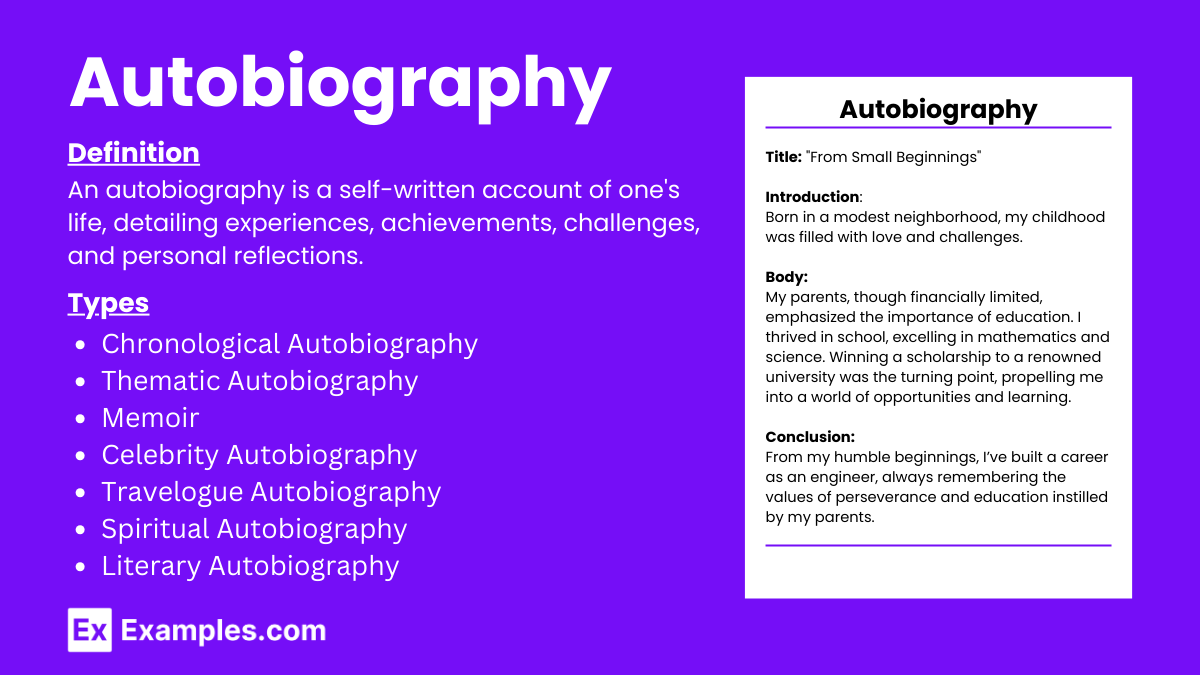
An autobiography is a captivating journey through the life of its author, offering a firsthand account of their experiences, challenges, and triumphs. It provides a unique insight into their personal growth, motivations, and the events that shaped their identity. By sharing intimate details and reflections, an autobiography connects readers to the author’s world, making their story both relatable and inspiring.
What Is an Autobiography?
An autobiography is a self-written account of the author’s own life, detailing personal experiences, significant events, and milestones. It is written from the first-person perspective and provides insight into the author’s thoughts, feelings, and reflections.
Types of Autobiography
- Full Autobiography: Covers the entire life of the author, from birth to the present or the end of their life.
- Memoir: Focuses on specific events, periods, or themes in the author’s life rather than their entire life.
- Personal Essay: A short piece that explores a particular aspect or experience in the author’s life.
- Confessional: Reveals deeply personal and often private aspects of the author’s life, usually with a focus on emotional experiences.
- Spiritual Autobiography: Focuses on the author’s spiritual journey and experiences.
- Political/Professional Autobiography: Concentrates on the author’s career, achievements, and professional experiences.
- Coming-of-Age Autobiography: Centers around the author’s formative years, detailing the transition from childhood to adulthood.
Autobiography format
1. title page.
- Title of the Autobiography
- Author’s Name
2. Table of Contents
- List of chapters and page numbers
3. Preface or Introduction
- Author’s purpose for writing
- Brief overview of what the reader can expect
4. Chronological Structure
- Chapter 1: Early Life
- Birth details
- Family background
- Childhood experiences
- Chapter 2: Education
- Schools attended
- Significant academic achievements
- Memorable teachers or mentors
- Chapter 3: Career Beginnings
- First job experiences
- Early challenges and successes
- Chapter 4: Major Life Events
- Personal milestones (e.g., marriage, children)
- Key professional achievements
- Chapter 5: Challenges and Triumphs
- Obstacles faced and how they were overcome
- Turning points and life lessons
- Chapter 6: Reflections
- Personal growth and insights
- Future aspirations
5. Epilogue
- Summary of the author’s journey
- Final thoughts and messages to readers
6. Appendices (if applicable)
- Photos, documents, letters
7. References or Acknowledgements
- Credits to individuals who helped in the writing process
Examples of Autobiography
1. early life and education.
Title: “From Small Beginnings” Introduction: Born in a modest neighborhood, my childhood was filled with love and challenges. Body: My parents, though financially limited, emphasized the importance of education. I thrived in school, excelling in mathematics and science. Winning a scholarship to a renowned university was the turning point, propelling me into a world of opportunities and learning. Conclusion: From my humble beginnings, I’ve built a career as an engineer, always remembering the values of perseverance and education instilled by my parents.
2. Professional Growth
Title: “Climbing the Corporate Ladder” Introduction: Starting as an intern at a large corporation, I had big dreams but limited experience. Body: Through hard work and dedication, I navigated various roles, learning from mentors and overcoming numerous obstacles. Each promotion was a testament to my commitment and skills. My most significant achievement was leading a project that significantly boosted the company’s revenue. Conclusion: Today, as a senior executive, I reflect on my journey with pride, knowing that every step was a building block to my success.
3. Personal Transformation
Title: “A Journey to Wellness” Introduction: Struggling with obesity since childhood, my health was always a concern. Body: At 30, a health scare prompted a lifestyle change. I adopted a balanced diet, regular exercise, and mindfulness practices. The transformation was challenging but rewarding, leading to significant weight loss and improved mental health. Conclusion: Now, as a fitness coach, I inspire others with my story, proving that it’s never too late to prioritize health and wellness.
4. Overcoming Adversity
Title: “Turning Tragedy into Triumph” Introduction: Losing my job during an economic downturn was a devastating blow. Body: With no immediate prospects, I decided to start my own business. The journey was fraught with challenges, but each setback was a lesson. Gradually, my small startup grew into a successful enterprise, providing jobs and supporting the community. Conclusion: From the ashes of my job loss, I built a thriving business, demonstrating resilience and the power of entrepreneurship.
5. Lifelong Passion
Title: “The Art of Perseverance” Introduction: Art has always been my passion, but pursuing it as a career seemed unrealistic. Body: Despite societal pressure to choose a conventional path, I followed my heart. Years of dedication, attending art school, and countless hours of practice led to my first gallery exhibition. The positive reception was a dream come true. Conclusion: Today, as a recognized artist, I live my passion every day, encouraging others to pursue their dreams relentlessly.
Examples of Autobiography in literature
Autobiographies provide a window into the personal lives and experiences of individuals, offering readers an intimate look at their journeys, thoughts, and emotions. Here are some notable examples of autobiographies in literature:
1. “The Diary of a Young Girl” by Anne Frank
Anne Frank’s poignant diary, written during her time hiding from the Nazis in World War II, offers a powerful and moving account of her life, fears, and hopes. Her writing provides a personal perspective on the horrors of war and the resilience of the human spirit.
2. “Long Walk to Freedom” by Nelson Mandela
Nelson Mandela’s autobiography chronicles his early life, education, and 27 years in prison, detailing his role in the fight against apartheid in South Africa. His narrative is a testament to his dedication to justice and equality.

3. “I Know Why the Caged Bird Sings” by Maya Angelou
Maya Angelou’s first autobiography covers her childhood and teenage years, addressing themes of identity, racism, and literacy. Her lyrical and evocative prose makes this a significant work in American literature.
4. “The Story of My Life” by Helen Keller
Helen Keller’s autobiography recounts her experiences growing up deaf and blind and her journey to learn to communicate. Her story is inspiring and highlights the importance of perseverance and education.
5. “Dreams from My Father” by Barack Obama
This memoir by former President Barack Obama explores his upbringing, his search for identity, and his early career in community organizing. The book offers insights into his personal life and the formative experiences that shaped his worldview.
6. “Bossypants” by Tina Fey
Tina Fey’s humorous autobiography covers her career in comedy, from her early days in improv to her work on “Saturday Night Live” and “30 Rock.” Her witty and candid writing provides an entertaining look at her life and career.
7. “Becoming” by Michelle Obama
In her autobiography, Michelle Obama shares her journey from her childhood in Chicago to her years as the First Lady of the United States. Her story is one of resilience, hope, and the pursuit of excellence.
8. “Narrative of the Life of Frederick Douglass, an American Slave” by Frederick Douglass
Frederick Douglass’s powerful autobiography details his life as a slave and his journey to freedom. His narrative is a critical work in American history and literature, highlighting the brutality of slavery and the importance of freedom.
9. “The Autobiography of Malcolm X” as told to Alex Haley
This autobiography of Malcolm X, written with the assistance of Alex Haley, covers his life from his troubled youth to his conversion to Islam and his work as a civil rights activist. The book provides deep insights into his beliefs and the evolution of his views.
10. “The Glass Castle” by Jeannette Walls
Jeannette Walls’s memoir recounts her unconventional and often challenging upbringing with her deeply dysfunctional parents. Her story is both heartbreaking and uplifting, showcasing her determination to overcome adversity.
Examples of Autobiography for students
An autobiography is a self-written account of one’s own life. Here are some examples tailored for students to help them understand how to write their own autobiographies.
1. Elementary School Student
My life so far.
My name is Emma Johnson, and I am eight years old. I was born on June 5, 2016, in Austin, Texas. I live with my mom, dad, and my little brother, Liam. We also have a dog named Buddy.
I go to Maple Elementary School, and I am in the third grade. My favorite subjects are art and science. I love drawing and doing experiments. When I grow up, I want to be a scientist and discover new things.
In my free time, I like to play soccer with my friends and read books about space. My favorite book is “The Magic School Bus: Lost in the Solar System.” I also enjoy baking cookies with my mom and watching movies with my family.
2. Middle School Student
A journey of learning and fun.
Hello! My name is Michael Brown, and I am 12 years old. I was born on March 14, 2012, in Seattle, Washington. I have an older sister named Sarah, and we get along really well.
I attend Pinewood Middle School and am currently in the seventh grade. My favorite subjects are math and history. I find math challenging but exciting, and I love learning about historical events and figures.
I am part of the school’s basketball team and play as a point guard. Basketball has taught me a lot about teamwork and perseverance. In addition to sports, I enjoy playing video games and coding. I recently started learning Python, and it’s fascinating to create my own games.
3. High School Student
My path to adulthood.
I am Samantha Carter, a 16-year-old junior at Lincoln High School in Chicago, Illinois. I was born on August 21, 2007, and have two younger brothers, David and Andrew. My parents are both teachers, which has inspired me to value education.
At school, I excel in English and biology. I am particularly passionate about creative writing and have won several awards for my short stories. I am also a member of the school’s debate team, which has greatly improved my public speaking skills.
Outside of academics, I volunteer at the local animal shelter, where I help take care of abandoned pets. This experience has been incredibly rewarding and has inspired me to consider a career in veterinary medicine. In my spare time, I enjoy hiking, reading novels, and spending time with my friends.
4. College Student
Chasing dreams and building a future.
My name is James Lee, and I am a 20-year-old sophomore at the University of California, Berkeley. I was born on February 10, 2004, in San Francisco, California. I am the eldest of three siblings, with a younger brother and sister.
I am majoring in Computer Science, and I am fascinated by artificial intelligence and machine learning. My interest in technology began when I was in high school and participated in a robotics club. Since then, I have worked on various projects, including developing apps and working on AI models.
In addition to my studies, I am part of the university’s coding club and participate in hackathons regularly. I also work part-time as a research assistant in the computer science department. My goal is to contribute to cutting-edge technology that can make a positive impact on the world.
Outside of academics and work, I enjoy playing the guitar, exploring new cuisines, and traveling. My most memorable trip was to Japan, where I immersed myself in the culture and learned a lot about their technological advancements.
5. High School Freshman
A new beginning.
My name is Alex Martinez, and I am 14 years old. I was born on November 3, 2009, in Miami, Florida. I live with my mom, dad, and older sister, Isabella. We also have a parrot named Coco who loves to mimic our conversations.
I recently started my freshman year at Coral Reef High School, and it’s been a big transition from middle school. My favorite subjects are biology and art. I love learning about living organisms and how they interact with their environment. Drawing and painting are my creative outlets, and I often combine these interests by sketching animals and plants.
In middle school, I was part of the science club and participated in several science fairs. One of my proudest moments was winning first place for my project on renewable energy sources. This experience sparked my interest in environmental science, and I hope to pursue this field further in high school and beyond.
Outside of school, I enjoy swimming and am part of a local swim team. Training and competing in swim meets have taught me discipline and the importance of hard work. I also volunteer at a community garden, where I help grow vegetables and learn about sustainable farming practices.
In my free time, I love reading adventure novels and exploring nature trails with my family. My dream is to become a marine biologist and work on preserving ocean ecosystems. I am excited about the opportunities high school will bring and look forward to making new friends and discovering new passions.
Short Autobiography examples
1. academic journey.
A Path of Lifelong Learning My name is Sarah Johnson. Growing up in a small Ohio town, I was the first in my family to attend college. I earned my Bachelor’s in English Literature from Ohio State University and a Master’s from the University of Chicago. Now, as a high school English teacher, I strive to inspire my students with a love for literature.
2. Overcoming Adversity
Rising Above Challenges I’m Michael Thompson from Detroit. Despite a tough upbringing, I excelled academically and earned a scholarship to Michigan State University. Majoring in Sociology, I focused on social justice. Now, I work with at-risk youth in Detroit, using my experiences to guide and mentor them.
3. Passion for Art
From Canvas to Community My name is Emma Williams, and I grew up in San Francisco. I attended the California College of the Arts, where I developed my skills and completed a mural project celebrating San Francisco’s diversity. Now, I run a nonprofit, Art for All, providing art education to underserved communities.
4. Career in Technology
Innovating for a Better Tomorrow I’m David Harris from Silicon Valley. My interest in technology led me to pursue a Computer Science degree at Stanford University, specializing in artificial intelligence. Today, I work as a software engineer at a startup focused on sustainable tech solutions.
5. A Love for Music
Harmonizing Life My name is Lisa Chen, a musician from New York City. I began playing the piano at age five and later attended Juilliard School. After graduating, I performed with orchestras worldwide and now teach music, sharing my passion with the next generation of musicians.
Examples of Autobiography for College students
1. discovering my passion for environmental science.
Discovering My Passion for Environmental Science My name is Jessica Brown, and I am a junior majoring in Environmental Science at the University of California, Berkeley. Growing up in a small town surrounded by nature, I developed a deep appreciation for the environment. In high school, I joined the Eco-Club and participated in several local clean-up projects, which fueled my interest in environmental conservation. At Berkeley, I have immersed myself in my studies, focusing on sustainable practices and climate change mitigation. Last summer, I interned with a non-profit organization dedicated to preserving coastal ecosystems. This experience solidified my career goal to work in environmental policy and make a tangible impact on our planet.
2. Overcoming Challenges and Achieving Academic Success
Overcoming Challenges and Achieving Academic Success My name is John Martinez, and I am a sophomore at New York University, majoring in Computer Science. Coming from a low-income family in a rough neighborhood, I faced numerous challenges growing up. Despite these obstacles, I excelled academically and became the first in my family to attend college. My journey to NYU was not easy. I balanced multiple part-time jobs to support myself and my family while maintaining a high GPA. The hard work paid off when I received a full scholarship to NYU. Now, I am passionate about using technology to solve real-world problems and hope to inspire others from similar backgrounds to pursue their dreams.
3. Pursuing a Career in Creative Writing
Pursuing a Career in Creative Writing I am Emily Davis, a senior at Columbia University majoring in Creative Writing. Ever since I can remember, I have been captivated by stories and the power of words. In high school, I wrote for the school newspaper and won several creative writing contests. At Columbia, I have honed my writing skills through workshops and feedback from professors and peers. My short stories have been published in several literary magazines, and I am currently working on my first novel. My dream is to become a published author and to teach creative writing to inspire others to find their voice.
4. From Athlete to Future Doctor
From Athlete to Future Doctor My name is Michael Lee, and I am a pre-med junior at Stanford University. As a child, I was passionate about sports and played soccer throughout high school. However, a severe injury during a game sparked my interest in medicine. Witnessing the impact doctors had on my recovery, I decided to pursue a career in healthcare. At Stanford, I am majoring in Biology and volunteering at a local hospital. My goal is to become an orthopedic surgeon, combining my love for sports with my desire to help others heal and achieve their best physical health.
5. Embracing Cultural Heritage Through Anthropology
Embracing Cultural Heritage Through Anthropology I am Alex Kim, a sophomore studying Anthropology at the University of Chicago. Growing up in a multicultural household, I was always fascinated by different cultures and traditions. My family’s heritage sparked my interest in understanding human societies and cultural dynamics. In college, I have conducted research on indigenous cultures and participated in archaeological digs. These experiences have deepened my appreciation for cultural diversity and the importance of preserving our history. My ambition is to work as a cultural anthropologist, contributing to academic research and promoting cross-cultural understanding.
More Examples & Samples of Autobiography in PDF
1. western autobiography.
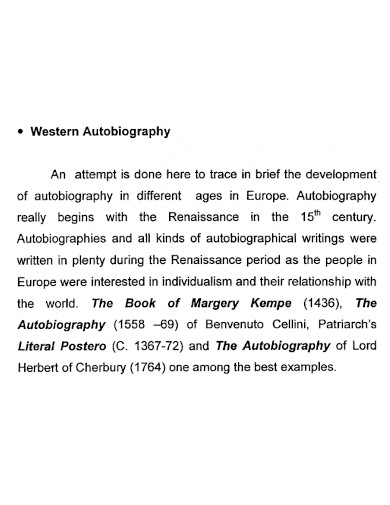
2. Autobiography Sample
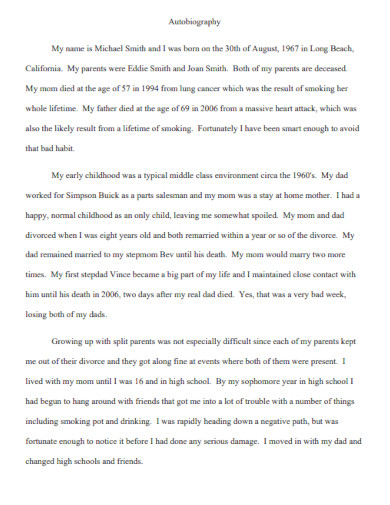
3. Autobiography PDF
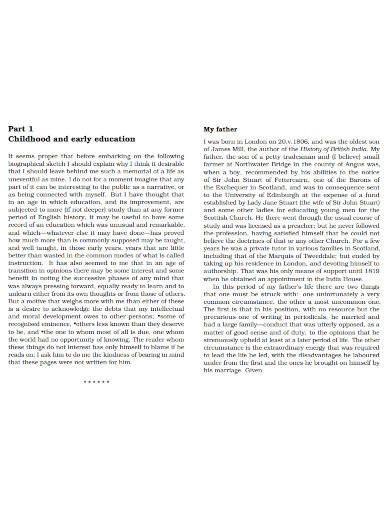
4. Autobiography as a Literary Form
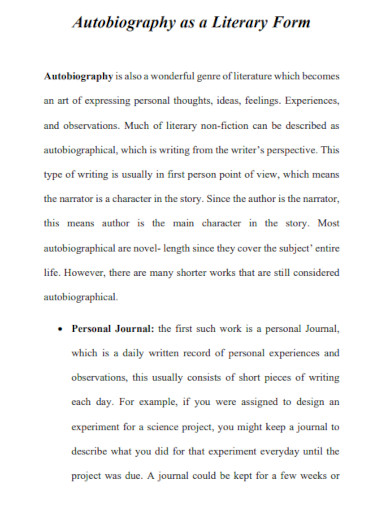
5. Autobiography Format
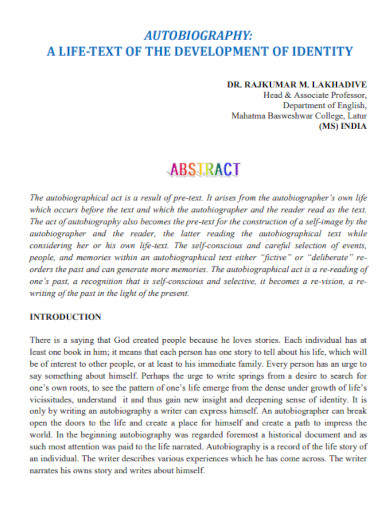
6. Autobiography Sample Template
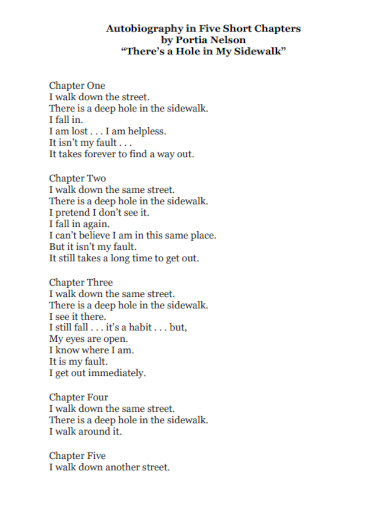
7. Standard Autobiography
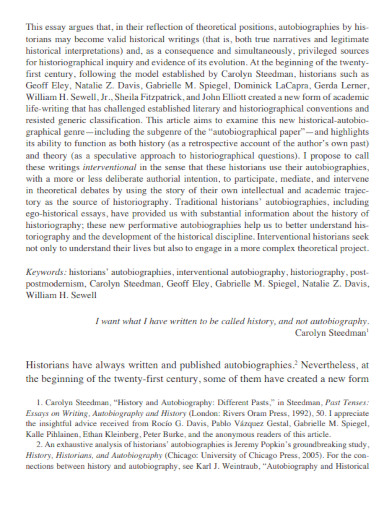
8. The Confessions as Autobiography
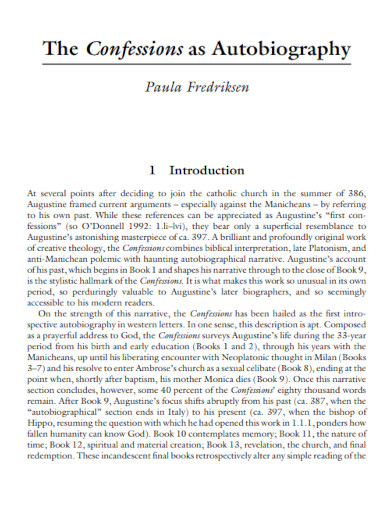
9. Autobiography Sample Lesson Plan
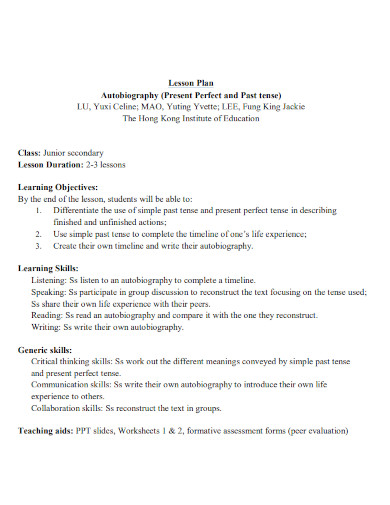
10. Truth in Autobiography
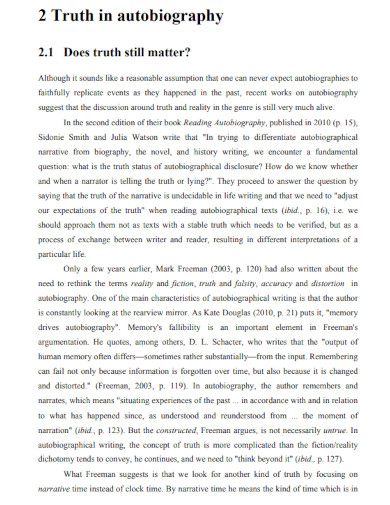
Purpose of an Autobiography
An autobiography serves multiple important purposes, each contributing to the value and significance of this form of writing. Here are some key purposes of an autobiography:
1. Self-Reflection and Understanding
- Self-Awareness: Writing an autobiography allows individuals to reflect on their life experiences, thoughts, and feelings. This reflection can lead to greater self-awareness and understanding of one’s own identity and journey.
- Personal Growth: Through the process of recounting life events, individuals can gain insights into their personal growth and development. It helps in recognizing patterns, learning from past mistakes, and celebrating achievements.
2. Preservation of Memories
- Historical Record: An autobiography serves as a personal historical record, preserving memories and experiences that might otherwise be forgotten. It captures the essence of a person’s life, including significant events, milestones, and personal anecdotes.
- Legacy: For future generations, an autobiography provides a way to learn about the life and times of their ancestors. It becomes a cherished family heirloom that keeps the writer’s legacy alive.
3. Sharing Life Lessons
- Inspiration: By sharing their life stories, individuals can inspire and motivate others. Readers can find courage, strength, and hope in the experiences of the writer, especially when they face similar challenges.
- Education: Autobiographies can educate readers about different cultures, historical periods, and personal experiences. They offer unique perspectives and insights that can broaden the reader’s understanding of the world.
4. Emotional Expression
- Catharsis: Writing an autobiography can be a therapeutic process, allowing individuals to express and process their emotions. It provides a safe space to explore and articulate feelings related to both joyful and painful experiences.
- Connection: Sharing personal stories can create a sense of connection and empathy between the writer and the readers. It fosters a deeper understanding and appreciation of the human experience.
5. Creative Expression
- Artistic Outlet: Autobiographies offer a platform for creative expression. Writers can use their narrative skills to craft compelling and engaging stories, blending factual recounting with literary techniques.
- Voice and Style: Through autobiographies, individuals can develop and showcase their unique voice and writing style. It is a way to express their individuality and creativity.
6. Documentation of Personal Achievements
- Milestones and Achievements: An autobiography highlights the significant milestones and achievements in a person’s life. It serves as a celebration of one’s accomplishments and contributions.
- Professional Journey: For professionals, an autobiography can document their career journey, challenges, successes, and the impact they have made in their field.
Autobiography vs. Biography
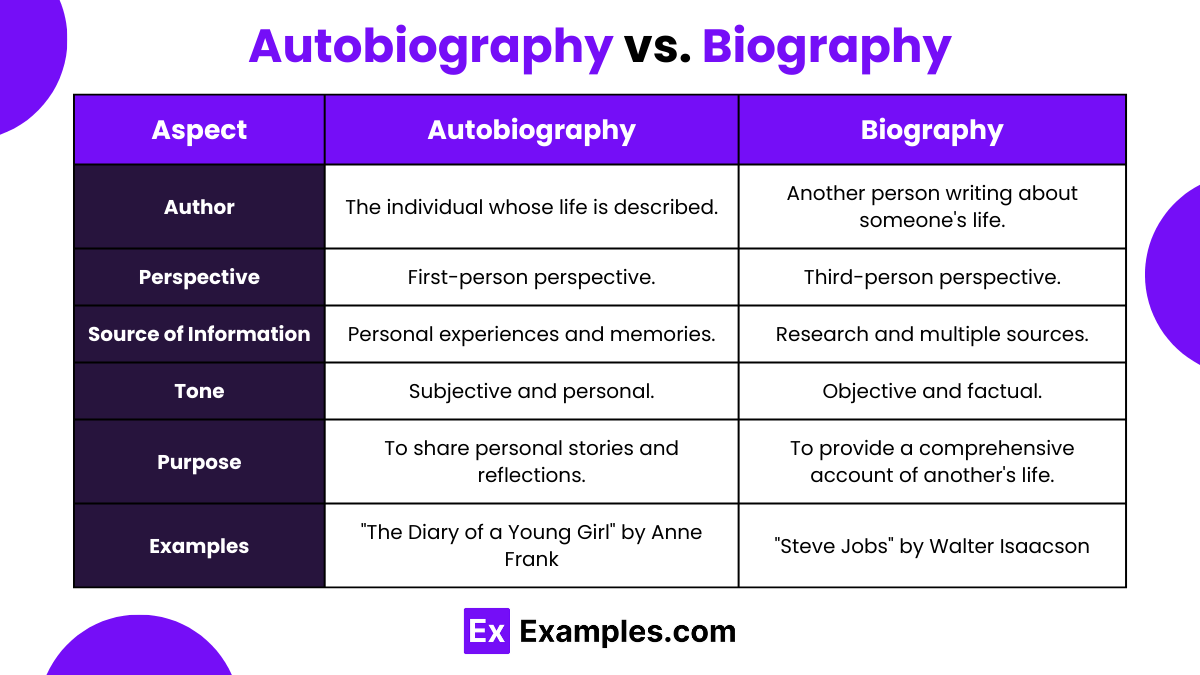
Autobiography vs. Memoir
How to write an autobiography, 1. reflect on your life.
- Take time to think about significant events, experiences, and people that have shaped your life.
- Make a list of key milestones, achievements, challenges, and turning points.
2. Define Your Purpose
- Decide why you are writing your autobiography. Are you documenting your life for family and friends, or do you hope to inspire or educate others?
- Understanding your purpose will help you focus your narrative.
3. Create an Outline
- Organize your thoughts and memories into a chronological or thematic structure.
- Typical sections include childhood, education, career, relationships, and key life events.
4. Start with a Strong Opening
- Grab your reader’s attention with an engaging introduction. You might start with a significant event, a vivid memory, or a statement about your life philosophy.
5. Write Your Story
- Use your outline as a guide and begin writing your story.
- Be honest and authentic. Share your thoughts, feelings, and reflections.
- Include anecdotes, dialogues, and descriptions to bring your experiences to life.
6. Be Honest and Vulnerable
- Authenticity is crucial in an autobiography. Share not only your successes but also your struggles and failures.
- Readers connect with genuine stories and emotions.
7. Include Personal Reflections
- Reflect on the lessons you’ve learned and how your experiences have shaped you.
- This adds depth to your story and provides valuable insights to your readers.
8. Edit and Revise
- After completing your first draft, take a break before revising. This helps you see your work with fresh eyes.
- Check for clarity, coherence, and consistency. Ensure your narrative flows smoothly.
- Correct any grammatical errors and refine your writing style.
9. Seek Feedback
- Share your draft with trusted friends, family members, or writing groups.
- Consider their feedback and make necessary revisions.
10. Polish Your Final Draft
- Ensure your autobiography is well-organized, engaging, and free of errors.
- Add photos or documents that complement your story if appropriate.
How do I start writing an autobiography?
Begin with a captivating hook, then introduce yourself and provide background information. Outline key life events and choose a central theme to guide your narrative.
What should I include in my autobiography?
Include significant life events, achievements, challenges, personal reflections, and key milestones. Focus on moments that shaped your identity and values, and use vivid descriptions.
How long should an autobiography be?
The length can vary, but typically ranges from 50,000 to 100,000 words. Focus on covering important events and themes without overwhelming the reader with unnecessary details.
Should I write my autobiography in chronological order?
Writing in chronological order is common, but you can start with a significant event and backtrack. Ensure your narrative flows logically and maintains reader engagement.
Can I include other people’s stories in my autobiography?
Yes, but obtain their permission if you’re sharing personal details. Focus on how their stories intersect with and influence your life, keeping the main narrative about you.
How do I make my autobiography engaging?
Use vivid descriptions, sensory details, and emotional reflections. Incorporate anecdotes, dialogues, and varied sentence structures to maintain reader interest and make your story relatable.
Do I need to be famous to write an autobiography?
No, anyone can write an autobiography. Every life has unique experiences and lessons that can inspire, inform, and entertain readers, regardless of the writer’s fame.
How honest should I be in my autobiography?
Aim for honesty and authenticity, but be considerate of others’ privacy and feelings. Balance transparency with respect, and avoid including harmful or unnecessary details.
Can I use humor in my autobiography?
Absolutely! Humor can make your story more engaging and relatable. Use it appropriately to lighten serious topics or provide a fresh perspective on your experiences.
How do I conclude my autobiography?
Summarize key points and reflect on your life journey. Share lessons learned, future aspirations, and final thoughts to provide closure and leave a lasting impression on readers.
Text prompt
- Instructive
- Professional
10 Examples of Public speaking
20 Examples of Gas lighting
15 Autobiography Examples to Inspire Your Own

So you’re ready to write an autobiography ! Congratulations; this can be a gratifying personal project. And just like any creative endeavor, it’s a great idea to start by getting inspired.
In this article, we’re sharing 15 stellar autobiography examples to get your wheels turning. We’ll also share some need-to-know info on the different types of autobiographies and autobiography layouts, and we’ll leave you with a list of catchy ways to start your book. Let’s get going!

Free Ebook: From Memories to Masterpiece
Get our step-by-step guide to writing and publishing a bestselling memoir!
What are the different types of autobiographies?
As it turns out, there are many different ways to write a book about yourself. You can go the traditional autobiography route, which is a chronological account of your entire life. Or you can write a memoir , which zeroes in on specific themes or time periods in your life.
If you’d like, your autobiography can be composed of individual personal essays, or you can blend your autobiography with literary techniques to create a piece of creative nonfiction .
There are graphic autobiographies that use comics or other combinations of images and text to illustrate your life story, or you can simply publish an edited version of your journal or diary .
You can write a travelog that documents your life through your adventures or blend elements of your life with made-up stories to create autobiographical fiction .
When it comes to sharing your life story, there are few rules!
How can I lay out my autobiography?
Did you know there are multiple ways you can structure your autobiography? The most common is to put it in chronological order . But you can also lay out your book in reverse chronological order or even jump around in time .
Here are a few other layouts to consider:
- Thematic or topical . As you outline your autobiography, pay attention to themes that emerge. You can lay out your autobiography by central ideas rather than by time.
- Flashback and flash-forward. This nonlinear approach can be a great way to create some excitement and intrigue in your life story.
- Cyclical structure. Is there one event that you feel defined your life story? Why not try circling back to it throughout your book? This can be an interesting way to demonstrate how your perspective changed with time.
If you need a little more help laying out your autobiography, we have free autobiography templates and free book templates to help you.
Related: 50 Eye-Catching Autobiography Titles
15 Autobiographies to inspire your own
Ready to get your creative juices flowing? Here are some examples of autobiography to add to your reading list.
1. The Diary of a Young Girl by Anne Frank

One of the best-known autobiographies, The Diary of a Young Girl, is an excellent example of a journal-style layout. Featuring the story of a young girl who is hiding during the Holocaust, aspiring writers will find inspiration in Frank’s raw emotions and candor.
2. Autobiography of a Yogi by Paramahansa Yogananda

A favorite of Steve Jobs, this autobiography details the author’s spiritual journey through yoga and meditation. It’s a wonderful example of how to blend the recounting of events with spiritual insights and philosophical teachings.
3. Long Walk to Freedom by Nelson Mandela

The former South African president wrote this stunning autobiography about his struggle against apartheid, his imprisonment, and his presidency. Aspiring autobiography writers who want to write a book about social change should read this one.
4. The Story of My Experiments with Truth by Mahatma Gandhi

In his autobiography, Gandhi explores his philosophy of nonviolent resistance through his political and spiritual journey. Writers will appreciate this book for the way it weaves stories of personal growth into a larger narrative of social change.
5. I Know Why the Caged Bird Sings by Maya Angelou

One of several autobiographical works by Angelou, I Know Why the Caged Bird Sings explores her coming-of-age experience amidst racism and a traumatic childhood. Writers should read this to hear Angelou’s powerful story and be inspired by her vivid language.
6. The Story of My Life by Hellen Keller

Keller details her remarkable life as a deaf and blind person, sharing intimate details about her education and advocacy work. Aspiring writers will benefit from reading Keller’s sensory-rich language since she has the unique experience of navigating the world through touch.
7. The Autobiography of Malcolm X by Malcolm X

This autobiography, written in collaboration with journalist Alex Haley, tracks Malcolm X from his youth through his adulthood as a prominent activist in the civil rights movement. Read this one to learn tips and tricks for writing about your personal evolution.
8. The Story of My Life by Clarence Darrow

Darrow shares his experiences as a civil libertarian and prominent American Lawyer in this enlightening autobiography. Writers should read this one to learn how to build a persuasive argument in their book.
9. Born a Crime by Trevor Noah

South African comedian, television host, and political commentator Trevor Noah wrote this autobiography detailing his upbringing during apartheid in South Africa. This is a must-read for writers who are looking to infuse humor into their autobiographies—even when writing about heavy subjects .
10. I am Malala by Malala Yousafzai

In her autobiography, Yousafzia recounts her tumultuous and sometimes terrifying journey advocating for equal education for girls. If you want to write your own autobiography, read this one first to learn how to bring an authentic voice to your narrative.
11. The Hiding Place by Corrie Ten Boom

Boom’s autobiography shares the harrowing story of her family’s efforts to hide Jews from the Nazis during World War II. Writers should read this to witness how Boom weaves a historical narrative into her life story.
12. Agatha Christie: An Autobiography by Agatha Christie

Renowned mystery writer Agatha Christie took time away from her suspenseful novels to write a book about herself. If you plan to write an autobiography, read Christie’s first to learn how to build a sense of intrigue.
13. Chronicles: Volume 1 by Bob Dylan

If you’re an artist writing your autobiography, you’ll be inspired by Dylan’s. It shares his unique perspective on the creative process in music and literature and delves into what it means to maintain your artistic vision.
14. When Breath Becomes Air by Paul Kalanithi

This well-known autobiography may make you cry, but it’s well worth the read. Written by a surgeon as he faces a terminal illness, it’s a must-read for any author exploring themes of mortality in their writing.
15. Dreams From My Father by Barack Obama

This autobiography by the former U.S. president is a great read for anyone aspiring to write an autobiography that intertwines their personal story with a larger societal and political narrative.
- 31 Best Autobiographies
- 30 Celebrity Autobiographies
What is a catchy autobiography introduction?
Sometimes the hardest part of a new project is getting started. If you’re ready to begin writing your autobiography and need a good opener, here are some angles to consider:
- Start by describing a childhood dream and how it influenced your journey.
- Open with a letter to your younger self.
- Share a formative childhood memory.
- Start with a thought-provoking question you’ll answer as your book progresses.
- Talk about an object that’s meaningful to you and tie it to a larger story about your life.
With so much inspiration and so many wonderful resources, there’s never been a better time to write your autobiography. If, after reading a few books on this list, you’re not sure where to start with yours—let us help! Just sign up for a book consultation to get started.

IMAGES
VIDEO
COMMENTS
In an essay about yourself, you must catch your readers' attention, leaving an impression of an outstanding learner and person. You're in the right place if you are stuck preparing a student autobiography. This article will guide you through the writing process, offering autobiography questions for students together with valuable prompts.
However, these 15 questions will guide you in writing an autobiography that you can be proud of and the 3 simple principles discussed above will help you make your memoir flawless. 🤓 10 Autobiography Questions and Answers. Below, we've listed some autobiography questions with possible short answers.
Writing an autobiography can be a powerful way to reflect on your life experiences, share your story, and leave a lasting legacy. Whether you're writing for personal reasons or planning to publish your autobiography, asking yourself the right questions can help you delve deep into your memories and uncover meaningful insights.
Examples of Good Starting Sentences for a Memoir . We've looked at the elements that make memoirs shine. Now, let's turn our attention to one of the most important parts of a personal account: the opening sentence. We've scoured some of the most successful, moving memoirs of all time to curate a list of memorable starting sentences.
However, it can be challenging to know where to start and how to structure your narrative. In this article, we'll provide you with a list of engaging writing prompts to help you begin your autobiography journey. We'll also include a FAQ section to address common questions about autobiography writing. Autobiography Writing Prompts Childhood Memories
Your autobiography template. While our full interview is over 100 questions, here are just 15 question prompts across different "life chapters" to get you started on the journey. Get the full template here. QUICKFIRE QUESTIONS. Name your favorite: Book, Movie, Musician, Quote, Animal, Word… CHILDHOOD
Then, use an outline, templates, sentence starters, and questions to help you write your autobiography. In this article, you are going to learn the fastest method for writing your autobiography. We are going to cover everything you need to know with examples and a free, downloadable, done-for-you template.
The biography questions listed here are designed to uncover the personal and human side of these figures, providing insights into their daily lives, relationships, and personal philosophies. Students can gain a broader perspective, going beyond the standard facts and dates to truly connect with these individuals on a more personal level. ...
Examples of Autobiography for students. An autobiography is a self-written account of one's own life. Here are some examples tailored for students to help them understand how to write their own autobiographies. 1. Elementary School Student My Life So Far. My name is Emma Johnson, and I am eight years old. I was born on June 5, 2016, in Austin ...
In this article, we're sharing 15 stellar autobiography examples to get your wheels turning. We'll also share some need-to-know info on the different types of autobiographies and autobiography layouts, and we'll leave you with a list of catchy ways to start your book. ... Start with a thought-provoking question you'll answer as your ...